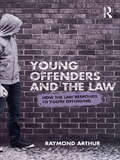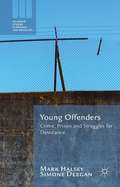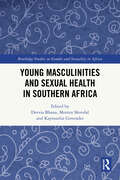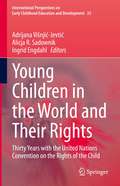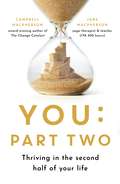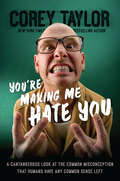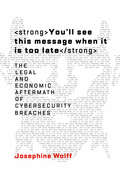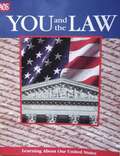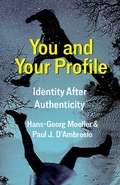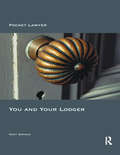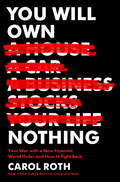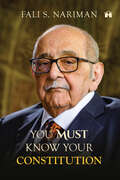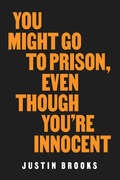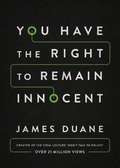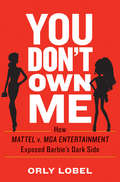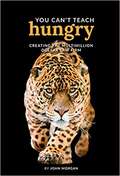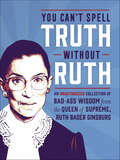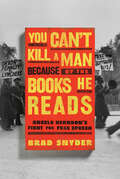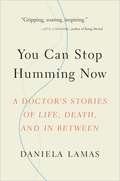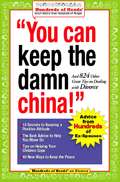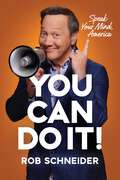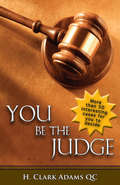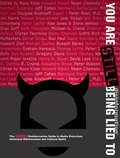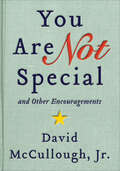- Table View
- List View
Young Offenders and the Law: How the Law Responds to Youth Offending
by Raymond ArthurHow does the law deal with young offenders, and to what extent does the law protect and promote the rights of young people in conflict with the law? These are the central issues addressed by Young Offenders and the Law in its examination of the legal response to the phenomenon of youth offending, and the contemporary forces that shape the law. This book develops the reader’s understanding of the sociological, criminological, historical, political, and philosophical approaches to youth offending in England and Wales, and also presents a comparative review of developments in other jurisdictions. It provides a comprehensive critical analysis of the legislative and policy framework currently governing the operation of the youth justice system in England and Wales, and evaluates the response of the legal system in light of modern legislative framework and international best practice. All aspects of trial and pre-trial procedure affecting young offenders are covered, including: the age of criminal responsibility, police powers, trial procedure, together with the full range of detention facilities and non-custodial options. Young Offenders and the Law provides, for the first time, a primary source of reference on youth offending. It is an essential text for undergraduate and postgraduate students of Law, Criminology, and Criminal Justice Studies.
Young Offenders
by Mark Halsey Simone DeeganYoung Offenders provides one of the most in-depth studies of young males seeking, if often failing, to find a life beyond crime and punishment. Through rich interview data of young offenders over a ten year period, this book explores the complex personal and situational factors that promote and derail the desistance process.
Young Masculinities and Sexual Health in Southern Africa (Routledge Studies on Gender and Sexuality in Africa)
by Deevia Bhana Kaymarlin Govender Morten SkovdalThis book examines the complex relationships between young masculinities and sexual health within Southern Africa. It considers how socio-cultural and economic factors shape young men’s experiences of masculinity and the effects on relationship dynamics, gender norms and sexual health.Through thematic chapters covering love, pleasure, social norms, risk, and HIV, the book emphasises the global importance of engaging young men in fostering gender equity and promoting healthier sexual practices. Readers will benefit from a diverse range of methodologies and perspectives that highlight the plurality and fluidity of masculinities, challenging monolithic accounts of young men in the region whilst illustrating the global relevance of understanding local contexts in shaping masculinities. The book provides valuable insights for developing effective sexual health interventions that recognise and embrace 'other' masculinities. Sexual health approaches that resonate with the lived realities of young men can potentially enhance young men’s engagement and participation in promoting healthier relationships and practices.With important insights for theory, policy, and practice, this book will be of interest to researchers across the fields of critical masculinity studies, sexual and reproductive health, gender studies and African studies, as well as policymakers, development practitioners, and activists.
Young Children in the World and Their Rights: Thirty Years with the United Nations Convention on the Rights of the Child (International Perspectives on Early Childhood Education and Development #35)
by Adrijana Višnjić-Jevtić Alicja R. Sadownik Ingrid EngdahlThis book provides different perspectives on the concept of children’s rights, including policy, educational, and children’s perspectives. It examines how the crucial ideas of the Convention on the Rights of the Child are respected and implemented in 14 countries in five regions of the world. It looks at early childhood education, children’s participatory rights, and at how these rights are promoted and guaranteed in different countries. It explores the professional practice of education and its complexities, challenges and dilemmas, as well as the role of play, and of listening and participation. The book advocates children’s rights today, arguing for its vital importance, in the best interests of the children. In doing so, it furthers the understanding of children’s rights and spreads knowledge about the Convention, as a means of celebrating its 30th anniversary. The UN Convention on the Rights of the Child (UNCRC) comprises the potential to change the lives of children to the very best. It may exalt children from the position of marginalized citizens to the centre of policies all over the world. Even though the concept of children’s rights is omnipresent, the respect for children’s rights must be discussed. While the Convention brings the new perspective of children as citizens to the world, there are still challenges in its application. The book interrogates challenges in understanding and applying children rights and offers possible answers to these challenges. The ratification process itself, does not guarantee that children’s rights are respected. While all adults should take responsibility for implementing the UNCRC in everyday life, Early Childhood Education should give opportunities for children to learn and live their rights.
You: Thriving in the Second Half of Your Life
by Campbell Macpherson Jane MacphersonThose of us in midlife are facing a dilemma: We are going through a period of multiple life-altering changes all at the same time - at work, at home and within. More of us are being made redundant than ever before, just when we need it the least. More of us are becoming self-employed. More of us are experiencing losses of status and crises of self-confidence - and that was before COVID-19! Our relationships with our partners, our parents and our children are all entering new phases. Meanwhile, half of us are also going through the menopause. Yet we are healthier and more vibrant than previous generations - and we are living longer. Much longer. We are 50 years young, not 50 years old.But more importantly, we don't know where or who to turn to for help. If the thought of consulting a 'life coach' makes you twitch involuntarily, but you want more than impenetrable financial advice from an IFA - this book is for you. Award-winning author Campbell Macpherson and yoga therapist co-author Jane Macpherson will help you embrace these changes and come out on top. From dealing with seemingly ubiquitous ageism and starting your own business to building resilience, finding a financial adviser you can trust and learning from professional athletes who are forced to 'retire' in their early thirties, the Macphersons show that your 'Part Two' isn't about retirement or ageing; it's about change and how you turn it to your advantage. You: Part Two is the must-read guide to thriving in the second half of your life.
You: Thriving in the Second Half of Your Life
by Campbell Macpherson Jane MacphersonThose of us in midlife are facing a dilemma: We are going through a period of multiple life-altering changes all at the same time - at work, at home and within. More of us are being made redundant than ever before, just when we need it the least. More of us are becoming self-employed. More of us are experiencing losses of status and crises of self-confidence - and that was before COVID-19! Our relationships with our partners, our parents and our children are all entering new phases. Meanwhile, half of us are also going through the menopause. Yet we are healthier and more vibrant than previous generations - and we are living longer. Much longer. We are 50 years young, not 50 years old.But more importantly, we don't know where or who to turn to for help. If the thought of consulting a 'life coach' makes you twitch involuntarily, but you want more than impenetrable financial advice from an IFA - this book is for you. Award-winning author Campbell Macpherson and yoga therapist co-author Jane Macpherson will help you embrace these changes and come out on top. From dealing with seemingly ubiquitous ageism and starting your own business to building resilience, finding a financial adviser you can trust and learning from professional athletes who are forced to 'retire' in their early thirties, the Macphersons show that your 'Part Two' isn't about retirement or ageing; it's about change and how you turn it to your advantage. You: Part Two is the must-read guide to thriving in the second half of your life.
You're Making Me Hate You: A Cantankerous Look at the Common Misconception That Humans Have Any Common Sense Left
by Corey TaylorIn the tradition of the late great George Carlin, New York Times bestselling author and lead singer of Slipknot and Stone Sour Corey Taylor sounds off in hilarious fashion about the many vagaries of modern life that piss him off. Whether it’s people’s rude behavior in restaurants and malls, the many indignities of air travel, eye-searingly terrible fashion choices, dangerously clueless drivers, and--most of all--the sorry state of much modern music, Taylor’s humor and insight cover civil society’s seeming decline--sparing no one along the way, least of all himself. Holding nothing back and delivered in Taylor’s inimitable voice, You’re Making Me Hate You is a cathartic critique of the strange world in which we find ourselves.
You'll See This Message When It Is Too Late: The Legal and Economic Aftermath of Cybersecurity Breaches (Information Policy)
by Josephine WolffWhat we can learn from the aftermath of cybersecurity breaches and how we can do a better job protecting online data. Cybersecurity incidents make the news with startling regularity. Each breach—the theft of 145.5 million Americans' information from Equifax, for example, or the Russian government's theft of National Security Agency documents, or the Sony Pictures data dump—makes headlines, inspires panic, instigates lawsuits, and is then forgotten. The cycle of alarm and amnesia continues with the next attack, and the one after that. In this book, cybersecurity expert Josephine Wolff argues that we shouldn't forget about these incidents, we should investigate their trajectory, from technology flaws to reparations for harm done to their impact on future security measures. We can learn valuable lessons in the aftermath of cybersecurity breaches. Wolff describes a series of significant cybersecurity incidents between 2005 and 2015, mapping the entire life cycle of each breach in order to identify opportunities for defensive intervention. She outlines three types of motives underlying these attacks—financial gain, espionage, and public humiliation of the victims—that have remained consistent through a decade of cyberattacks, offers examples of each, and analyzes the emergence of different attack patterns. The enormous TJX breach in 2006, for instance, set the pattern for a series of payment card fraud incidents that led to identity fraud and extortion; the Chinese army conducted cyberespionage campaigns directed at U.S.-based companies from 2006 to 2014, sparking debate about the distinction between economic and political espionage; and the 2014 breach of the Ashley Madison website was aimed at reputations rather than bank accounts.
You and the Law
by A. G. S. SecondaryHelp your students understand important aspects of the United States. These six worktexts combine easy-to-read information with summaries, exercises, and activities. Worktexts cover the following topics: Economics, Geography of the United States, United States Citizenship, Exploring American History, You and the Law, & Learning About Government. Reading Level: 3-4 Interest Level: 6-12
You and Your Profile: Identity After Authenticity
by Hans-Georg Moeller Paul J. D'AmbrosioMore and more, we present ourselves and encounter others through profiles. A profile shows us not as we are seen directly but how we are perceived by a broader public. As we observe how others observe us, we calibrate our self-presentation accordingly. Profile-based identity is evident everywhere from pop culture to politics, marketing to morality. But all too often critics simply denounce this alleged superficiality in defense of some supposedly pure ideal of authentic or sincere expression.This book argues that the profile marks an epochal shift in our concept of identity and demonstrates why that matters. You and Your Profile blends social theory, philosophy, and cultural critique to unfold an exploration of the way we have come to experience the world. Instead of polemicizing against the profile, Hans-Georg Moeller and Paul J. D’Ambrosio outline how it works, how we readily apply it in our daily lives, and how it shapes our values—personally, economically, and ethically. They develop a practical vocabulary of life in the digital age. Informed by the Daoist tradition, they suggest strategies for handling the pressure of social media by distancing oneself from one’s public face. A deft and wide-ranging consideration of our era’s identity crisis, this book provides vital clues on how to stay sane in a time of proliferating profiles.
You and Your Lodger
by Rosy BorderThis book provides lodger agreement in a 'what you see is what you get' document format. It sets out the duties and responsibilities and embodies them in an agreement that is fair to both public and their lodger. It shows you the terms or 'buzzwords', that are important, and explains what they mean.
You Will Own Nothing: Your War with a New Financial World Order and How to Fight Back
by Carol RothThe New York Times bestselling author and entrepreneur investigates what would happen if a new financial world order took hold, one in which global elites own everything and you own nothing—and yet you are somehow happy. When Carol Roth first heard that one of the World Economic Forum’s predictions for 2030 was “You will own nothing, and be happy,” she thought it was an outlandish fantasy. Then, she researched it. What she found was that a number of businesses, governments, and global elites share a vision of a future that sounds utopian: Everyone will have everything they need, and no one will own anything.From declines in home and vehicle ownership to global inflation and government spending, many of the trends of modern life reveal that a new world that is emerging—one in which Western citizens, by choice or by circumstance, increasingly do not own possessions or accumulate wealth. It’s the perfect economic environment for the rich and powerful to solidify their positions and prevent anyone else from getting ahead.In You Will Own Nothing¸ Roth reveals how the agendas of Wall Street, world governments, international organizations, socialist activists, and multinational corporations like Blackrock all work together to reduce the power of the dollar and prevent millions of Americans from taking control of their wealth. She shows why owning fewer assets makes you poorer and less free. This book is essential guide to protecting your hard-earned wealth for the coming generations.
You Must Know Your Constitution
by Fali S. Nariman26 November 1949 marks the date when the longest constitution in the world was formally adopted to guide the largest democracy in the world. It effectively transformed the British Dominion of India into one nation—the independent Republic of India. The supreme law of the land set forth the workings of Indian democracy and polity, and its provisions aimed to secure justice, liberty, equality, and fraternity for the people of India. As drafted and as conceived, the constitution makes provision for a functioning democracy and not an electoral autocracy, and this is how it has to be worked. It is therefore imperative for all citizens to familiarise themselves with its provisions.In this definitive tome, the author (who commenced his legal practice in the year the constitution was enacted) presents his comments in a style that is comprehensive, lucid, and systematic. The book traces the history and the origins of India&’s document of governance and explains its provisions. Some of the salient features of the book include:• An educative and informative exposition of the different parts of the Indian Constitution, including a bird&’s-eye view of—and with comments on—all the three hundred and ninety-five articles of the constitution and additions made by constitutional amendments.• Provides references of critical cases and prominent constitutional developments up to 31 July 2023.• Insightfully describes the structure, powers, and directive principles of government institutions.• Contains updated judicial pronouncements and legislative and constitutional amendments.In essence, You Must Know Your Constitution is an immensely readable and insightful compendium, inter alia, for judiciary aspirants, academicians, legal and administrative authorities, policymakers, research scholars, and students as well as for general readers who are interested in exploring the manifold facets of India&’s core document of governance.
You Might Go to Prison, Even Though You're Innocent
by Justin BrooksSurviving prison as an innocent person is a surreal nightmare no one wants to think about. But it can happen to you. Justin Brooks has spent his career freeing innocent people from prison. With You Might Go to Prison, Even Though You're Innocent, he offers up-close accounts of the cases he has fought, embedding them within a larger landscape of innocence claims and robust research on what we know about the causes of wrongful convictions. Putting readers at the defense table, this book forces us to consider how any of us might be swept up in the system, whether we hired a bad lawyer, bear a slight resemblance to someone else in the world, or are not good with awkward silence. The stories of Brooks's cases and clients paint the picture of a broken justice system, one where innocence is no protection from incarceration or even the death penalty. Simultaneously relatable and disturbing, You Might Go to Prison, Even Though You're Innocent is essential reading for anyone who wants to better understand how injustice is served by our system.
You Have the Right to Remain Innocent: What Police Officers Tell Their Children about the Fifth Amendment
by James DuaneLaw professor James J. Duane became a viral sensation thanks to a 2008 lecture outlining the reasons why you should never agree to answer questions from the police—especially if you are innocent and wish to stay out of trouble with the law. In this timely, relevant, and pragmatic new book, he expands on that presentation, offering a vigorous defense of every citizen’s constitutionally protected right to avoid self-incrimination. Getting a lawyer is not only the best policy, Professor Duane argues, it’s also the advice law-enforcement professionals give their own kids.
You Don't Own Me: How Mattel v. MGA Entertainment Exposed Barbie's Dark Side
by Orly LobelThe battle between Mattel, the makers of the iconic Barbie doll, and MGA, the company that created the Bratz dolls, was not just a war over best-selling toys, but a war over who owns ideas. When Carter Bryant began designing what would become the billion-dollar line of Bratz dolls, he was taking time off from his job at Mattel, where he designed outfits for Barbie. Later, back at Mattel, he sold his concept for Bratz to rival company MGA. Law professor Orly Lobel reveals the colorful story behind the ensuing decade-long court battle. This entertaining and provocative work pits audacious MGA against behemoth Mattel, shows how an idea turns into a product, and explores the two different versions of womanhood, represented by traditional all-American Barbie and her defiant, anti-establishment rival—the only doll to come close to outselling her. In an era when workers may be asked to sign contracts granting their employers the rights to and income resulting from their ideas—whether conceived during work hours or on their own time—Lobel’s deeply researched story is a riveting and thought-provoking contribution to the contentious debate over creativity and intellectual property.
You Can't Teach Hungry: Creating The Mutlimillion-dollar Law Firm
by John MorganThis book is the ultimate guide to building the multimillion-dollar law firm. In You Can't Teach Hungry, John Morgan shares his secrets, laying out a chapter-by-chapter road map to a sustainable legal practice. Morgan takes you through his earliest life lessons and combines them with practical advice he's gained from twenty-eight years of experience practicing law. You will see the inside workings of his business strategies, marketing plans, and the tools that Morgan uses to evaluate his firm and staff. You Can't Teach Hungry guides you through the steps to take a thorough inventory that will allow you to make hard decisions to improve and grow your law firm. Morgan walks you through proven practice pointers covering employees, management, case handling, and advertising, recommending steps to best prepare for adverse eventualities-such as diversifying your practice and having contingency plans in place. This book forces you to ask the tough questions about yourself and your practice-and the answers will amaze and motivate you. If you are starting your own firm, or are a partner in a small firm, this book is a must read. You Can't Teach Hungry shows you how to grow your practice with easy to use tools and techniques. It will change your practice and change your life. Accompanying the book are downloadable forms and templates that Morgan recommends to help manage your law practice.m
You Can't Spell Truth Without Ruth: An Unauthorized Collection of Wise-Ass Wisdom from the Queen of Supreme, Ruth Bader Ginsburg
by Mary ZaiaSpeaking the Ruth to AmericaRuth Bader Ginsburg became a Supreme Court Justice in 1993, but her popularity has exploded over the last couple of years as she has been adopted as a modern feminist icon. An octogenarian who has proven that disagreeing does not make one disagreeable, Ginsburg is well-known for her pithy observations as well as her strongly argued dissents. Beloved by many – including her ideological opposition, former Supreme Court Justice Antonin Scalia, who was her dear friend – Ginsburg’s wisdom has never been more relevant or more important to American democracy.Sample quotes:“Women belong in all places where decisions are being made…it shouldn’t be that women are the exception.”“Fight for the things you care about, but do it in a way that will lead others to join you.”“People ask me sometimes…When will there be enough women on the Court? And I say, ‘When there are nine.’ People are shocked. But there’d been nine men, and nobody’s ever raised a question about that.”“My mother told me two things constantly. One was to be a lady and the other was to be independent. For most girls growing up in the ‘40s, the most important degree was not your B.A. but your M.R.S.”“We have the oldest written constitution still in force in the world, and it starts out with three words, ‘We, the people.’”
You Can't Kill a Man Because of the Books He Reads: Angelo Herndon's Fight for Free Speech
by Brad SnyderThe story of a young, Black Communist Party organizer wrongly convicted of attempting to incite insurrection and the landmark case that made him a civil rights hero. Decades before the impeachment of an American president for a similar offense, Angelo Herndon was charged under Georgia law with “attempting to incite insurrection”—a crime punishable by death. In 1932, the eighteen-year-old Black Communist Party organizer was arrested and had his room illegally searched and his radical literature seized. Charged under an old slave insurrection statute, Herndon was convicted by an all-white jury and sentenced to eighteen to twenty years on a chain gang. You Can’t Kill a Man Because of the Books He Reads chronicles Herndon’s five-year quest for freedom during a time when Blacks, white liberals, and the radical left joined forces to define the nation’s commitment to civil rights and civil liberties. Herndon’s champions included the young, Black Harvard Law School–educated attorney Benjamin J. Davis Jr.; the future historian C. Vann Woodward, who joined the interracial Herndon defense committee; the white-shoe New York lawyer Whitney North Seymour, who argued Herndon’s appeals; and literary friends Ralph Ellison, Langston Hughes, and Richard Wright. With their support, Herndon won his freedom and reinvented himself as a Harlem literary star until a dramatic fall from grace. A legal odyssey of Herndon’s narrow escape from certain death because of his unpopular political beliefs, You Can’t Kill a Man Because of the Books He Reads explores Herndon’s journey from Alabama coal miner to Communist Party organizer to Harlem hero and beyond. Brad Snyder tells the stories of the diverse coalition of people who rallied to his cause and who twice appealed his case to the U.S. Supreme Court. They forced the Court to recognize free speech and peaceable assembly as essential rights in a democracy—a landmark decision in 1930s America as well as today.
You Can Stop Humming Now: A Doctor's Stories of Life, Death, and in Between
by Daniela LamasA critical care doctor's breathtaking stories about what it means to be saved by modern medicineModern medicine is a world that glimmers with new technology and cutting-edge research. To the public eye, medical stories often begin with sirens and flashing lights and culminate in survival or death. But these are only the most visible narratives. As a critical care doctor treating people at their sickest, Daniela Lamas is fascinated by a different story: what comes after for those whose lives are extended by days, months, or years as a result of our treatments and technologies?In You Can Stop Humming Now, Lamas explores the complex answers to this question through intimate accounts of patients and their families. A grandfather whose failing heart has been replaced by a battery-operated pump; a salesman who found himself a kidney donor on social media; a college student who survived a near fatal overdose and returned home, alive but not the same; and a young woman navigating an adulthood she never thought she'd live to see -- these moving narratives paint a detailed picture of the fragile border between sickness and health.Riveting, gorgeously told, and deeply personal, You Can Stop Humming Now is a compassionate, uncompromising look at the choices and realities that many of us, and our families, may one day face.
You Can Keep the Damn China!
by Robert J. Nachsin Jennifer Bright ReichAlmost 50% of American marriages end in divorce, so it stands to reason that most people have experienced the effects of divorce in some way. Breaking up is hard to do, but that rocky road can be smoothed with this guide featuring contributions by hundreds of former spouses who've made it out in one piece. Eye-opening stories and advice cover getting through the initial tough times; how to break the news to your children and help them cope; dealing with bitter in-laws and other family members; legal wrangling and dividing your stuff; maintaining a relationship with your ex (is it possible?); and more.
You Can Do It!: Speak Your Mind, America
by Rob SchneiderAn unfiltered and outrageously funny commentary on the threats to free speech in America from the legendary comedian, actor, and Emmy-nominated SNL writer. Rob Schneider&’s childhood in the San Francisco Bay area with parents of mixed-race backgrounds shaped his view of the world: that America affords the greatest opportunity for peoples from all nations and all faiths. But today, in this world gone mad, free speech is under attack. And Schneider keeps finding himself in controversy for questioning what woke ideology is doing to our great nation. Still, he refuses to be censored. In his debut book, Schneider will make you laugh out loud as he tells his unique story of a Hollywood-comedian-turned-vocal-advocate for open dialogue. He takes readers along for a ride through his life in show business (where he&’s starred in 27 movies with his friend Adam Sandler), shares stories from the glory days of Saturday Night Live, and makes a persuasive case for fearlessness in speech and pushing the boundaries in comedy. Comedians matter because they have a unique position in society to stand up against tyranny. In this book, Schneider shares never-before-told personal stories about Chris Farley, Norm Macdonald, Christopher Walken, Dana Carvey, and Martin Landau, and other comedy legends. You Can Do It! is part celeb memoir, part warning, and part siren call to action. It was said during the days of Covid the difference between a conspiracy theory and the truth was about six months. Influenced by his own experiences in Hollywood, Schneider illustrates his points about free expression with provocative commentary on things you aren't suppose to question, like identity politics, Covid tyranny, "global boiling," medical freedoms and more. Schneider refuses to believe he&’s dangerous for saying what he thinks. In fact, the opposite is true—it&’s dangerous to not question the narrative. It&’s dangerous to not exercise your free speech. That&’s what Rob Schneider&’s doing. And as this humorous, shocking, irreverent but insightful book shows readers, you can do it too.
You Be the Judge
by H. Clark AdamsH. Clark Adams let you be the judge on 60 cases that he’s already made his decisions on in the legal arena of small claims court. It’s enough to put you off wedded bliss forever, but if you did harbour strong opinions on how the case Smith v Brown a couple on the brink of matrimony, interfering relatives notwithstanding should unfold, H. Clark Adams welcomes you to the legal arena of small claims court. Here feuding former lovers, despondent homeowners, and singed shopkeepers bring their grievances against their erstwhile partners in love and business for a ruling that could end the troubled relationship and maybe even offer them material or monetary comfort. In a tone that’s distinctly light-hearted, the retired deputy judge offers readers a fictionalized sampling of the cases presented at small claims court, and the chance for them to pit their best instincts and powers of judgment against his. Part I of the book is a collection of cases from the gripping to the ridiculous, whilePart II features Adams’s decisions on the cases presented. If your view on these 60 cases differs from the learned judge, be warned: no appeal to his decision has ever been successful.
You Are Still Being Lied To: The New Disinformation Guide to Media Distortion, Historical Whitewashes and Cultural Myths (Disinformation Books)
by Russ KickA must-have revised and expanded edition of The Disinformation Companys classic anthology, You Are STILL Being Lied To contains more than a dozen all-new essays from contributors like Norman Solomon, Graham Hancock, Alex Jones, John Major Jenkins, Robert Bauval, Richard DeGrandpre, Alexandra Bruce,John Hogue, Gregory Davis, and Scott Creighton on topics ranging from the misleading marketing of antidepressants to the truth about the North American Union, from media consolidation to the New Thought movement.Editor Russ Kicks massive collection acts as a battering ram against the distortions, myths, and outright lies that have been shoved down our throats by the government, the media, corporations, organized religion, the scientific establishment, and others who want to keep the truth from us.An unprecedented group of researchers including Howard Zinn, Noam Chomsky, Howard Bloom, Sydney Schanberg, Michael Parenti, Riane Eisler, Jim Marrs, and many, many others paint a picture of a world where crucial stories are ignored or actively suppressed and the official version of events has more holes in it than Swiss cheese. A world where real dangers are downplayed and nonexistent dangers are trumpeted. In short, a world where you are being lied to.
You Are Not Special: And Other Encouragements
by David McCullough Jr.A profound expansion of David McCullough, Jr.'s popular commencement speech—a call to arms against a prevailing, narrow, conception of success viewed by millions on YouTube—You Are (Not) Special is a love letter to students and parents as well as a guide to a truly fulfilling, happy life.Children today, says David McCullough—high school English teacher, father of four, and son and namesake of the famous historian—are being encouraged to sacrifice passionate engagement with life for specious notions of success. The intense pressure to excel discourages kids from taking chances, failing, and learning empathy and self-confidence from those failures.In You Are (Not) Special, McCullough elaborates on his now-famous speech exploring how, for what purpose, and for whose sake, we're raising our kids. With wry, affectionate humor, McCullough takes on hovering parents, ineffectual schools, professional college prep, electronic distractions, club sports, and generally the manifestations, and the applications and consequences of privilege. By acknowledging that the world is indifferent to them, McCullough takes pressure off of students to be extraordinary achievers and instead exhorts them to roll up their sleeves and do something useful with their advantages.
